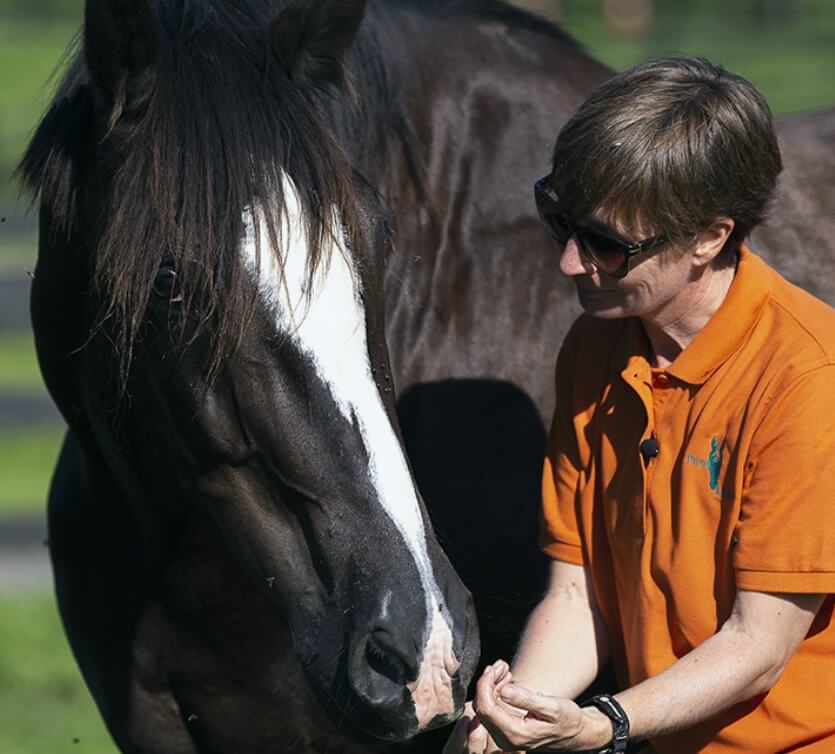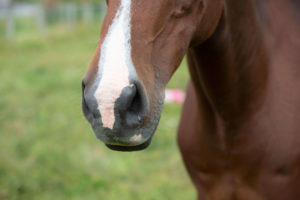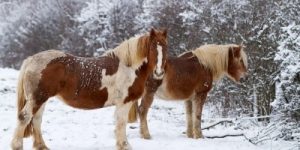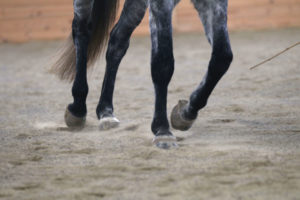When the topics of horse feeding and equine nutrition are discussed among horse people, opinions can vary greatly and fact and fiction may sometimes get confused.
A few weeks ago I surveyed members of my Training Journals course asking what questions they had regarding nutrition and what to feed their horse. Several questions came up more than once and they were questions that I recognized are often connected with misinformation. While there is a lot of information available on nutrition, the credibility of that information is sometimes questionable.
That’s why I decided to take these questions to a true expert in the field – Dr. Burt Staniar from Penn State University. Dr. Staniar was not only my Equine Nutrition professor when I attended Penn State, but he is a person who has dedicated his career to education and research in this field.
Here are a few of the questions I asked Dr. Staniar in our interview:
- Is it safe to give water to a hot horse? One long standing belief in the horse world is that horses will colic when given water when they are hot and tired after exercise
- Does alfalfa cause colic?
- Is wheat bran really beneficial as a laxative in the winter months?
- What does our horses manure tell us about their health and nutrition? This was Dr. Staniar’s favorite question to answer
As we mention in the video, Dr. Staniar has agreed to do a follow up interview to answer other questions you have on feeding and equine nutrition. So leave your questions in the comments!
Also, take a few moments to watch Dr. Staniar’s other videos at Equi Oris, his “vlog” dedicated to all questions related to the horse. “In this vlog, we will try to offer some answers, facts, and even opinions on topics in which horse enthusiasts may be interested. We hope this is an opportunity to open more communication and sharing of credible information.”
Thanks for watching and see you in the comments!
Callie
P.S. If you’d like to hear more information about equine nutrition join me in the training journals here.














38 Responses
Hi Callie,
Not sure where to read any already posted comments related to this topic, so I may be repeating a question or already covered topic. If you would direct me to where I may read other posts/questions, I would appreciate it.
I have heard that Bermuda is very suspect at causing colic in horses…hadn’t heard about about alfalfa!? Would like to hear the agreed consensus if any! 🙂
You are the best!!! Keep the info coming PLEASE! 🙂
Hi Laura, You were the first to comment, but there are lots of other comments and questions posted below now, thank you for your questions!
Hello there,
It’s my first time posting but I’ve been following your videos and articles with great interest for a while and I have a question that I would love to see answered by a professional: What is your take on flax seeds? Here in France, the general opinion is that flax seeds are great for horses (as a supplement, obviously) but that they need to be cooked, otherwise they can be poisonous. On the other hand, I know that cooking these seeds will cause the Omega 3 they contain to be destroyed, and I’ve read elsewhere that they should be given raw instead… So I really don’t know what to think anymore…
Many thanks in advance, and thank you for your brilliant videos and all your work!
Is feeding loose granular salt and minerals by free choice a good idea?
While most horsepeople would agree that horses need to eat several small meals per day, most boarding facilities in this area – northern CA – feed forage 2x per day with only a couple that will also feed lunch. The horses seem OK with this, even thriving. How important is it to feed many small meals for stabled horses as opposed to just 2x per day?
What supplements do senior horses really need and what about senior horses that are IR?
Sorry, one more question.
How important is it to soak hay pellets before feeding? I always soak mine but other people feel this isn’t necessary. Colic issues?
I have been feeding my horses hay pellets for years and they don’t have to be soak. They are the same as giving them hay.
I have a 21 y/0 gelding that has bad teeth so is on Timothy grass pellets and beet pulp pellets with some grain mixed in and made into a soaked mash. I am redoing his pen and run with sand so he can be on level footing, so he needs to be put on some psyllium and I have a friend whose older horse choaked because his psyllium was not totally dry when fed. My understanding is that it began expanding in his throat causing the choak. How do I feed the psyllium to my horse to make sure this doesn’t happen?
I give my horses psyllium in pellet form and never had a problem. My Vet recommend every eight weeks for seven days.
1.) Other than excessive water/moisture in manure, what else can owners look for to signal there might be a problem?
2.) What is the best way to transition a horse from a paddock with very little grass to a paddock with lots of green grass? (I’m moving from Massachusetts to North Carolina and not sure how to safely make his transition)
3.) I’ve always heard to give your horse free access to hay. Can you feed your horse too much hay or will he stop eating once he’s full?
From what I have read only Donkeys and Mules have enough sense to stop eating when they are full. I weight my horses feed so I know how much they are getting. I also check their weight to determine if I should give them more or less.
thank you for your time in doing this interview and answering questions. Our horses are lawn ornaments that get ridden casually several (or more) times a month – but never ridden hard. During the winter months (Nebraska) I give them each a 1/2 coffee can of grain (10% sweet feed) in the morning and one fleck of alfalfa in the evening. They also have free-will on a large bail of prairie hay. They are no stalled at all. During the summer/fall they are strictly on pasture. Am I feeding them correctly? – too much? You said you don’t feed your horse alfalfa – what do you feed your horse? thanks
I can’t say THANK YOU enough, Callie, for posting this video (and your other videos) with such valuable information.
Callie, very informative Q&A session with Dr Staniar!! I have a 19yo thoroughbred who, for lack of agistment choice/availability, is stable yarded 24/7 – no access to natural grazing. What feed regime should I consider (more or less of), aside from meadow hay which one tends to overcompensate on due to non-grazing. He has a small-holed hay net to slow the feasting during the night, a biscuit of hay in the morning, main feed in the evening. Has had laminitis in the past.
Many thanks, Linda-Melbourne Australia
Hi Callie, thank you for the video and another opportunity to send in questions. I have a 10yo TB mare, a good doer and chunky in build. She is grazed in a paddock 24/7 (in New Zealand) but when I ride I add a small amount of hard feed that day. It is just such a small amount, and a horse is such a big animal, that I sometimes feel bad she gets a few mouthfuls then it’s done. But my trainer and I watch her weight so she won’t get fat or hot. Is this “normal” with good doers that they can do well on what appears to be so little? Thanks, Melanie
Thank you for all the questions! Keep them coming – I look forward to doing a follow up session with Dr. Staniar!
I have heard a lot about metabolic syndrome & believe it may be caused by feeding excess carbohydrates/sugars to horses. I feed my 5 y.o. horse a soy hull mash with vits & supps & ground flax, could I be doing him harm? ie feeding too much carbs. thanks! great information Callie, much appreciated;)
Hi Callie, your site is so informative using your expert opinion & interviews- what are Dr. Staniar’s and your views about feeding hay before grain – I have read it can sometimes cause blockage & colic as opposed to grain then hay. My barn feeds grain then hay – thank you both, Emma
THANK YOU CALLIE, FOR YOUR PROVIDING US SO MUCH KNOWLEDGE. I ALWAYS ENJOY YOUR REPORTS AND COMMENTS.
I have heard, that the hay belly comes from the multiple times pregnancy. Can this be true ?
We had a horse colic the last week at the barn. I have noticed that he consistently groans every time he poops, wondering if this is a signal for a problem inside his gut? If he is not digesting his food or is it that he is 18yrs old and just part of getting older and not being able to digest his food? Thanks, Debbie
Callie, yesterday I noticed Thor was eating manure in his frozen barren pasture. What does that mean? Is he hungry?
Hi…. please elaborate on the sweet feed (rolled oats with molasses) question. My Arab is not worked very hard ( yup, another lawn ornament). He gets fed twice a day with alfalfa and grass hay. As a special treat he gets about 2 cups of sweet feed after a ride or when it is extremely cold out ( South Dakota can be icky in the winter). Most old time cowboys say there could be a problem with compacting.
Thanks !!
Hi, so I live in Ontario Canada and the biggest debate that I have heard over the years is about Beat Pulp, I have had people say it’s low in nutrition and basically a filler, and others how swear by it and feed it all winter. The other debate that has come up rather recently is about grains and which type is better, a pellet, or whole grains like what you might see in some sweetfeed but without molasses. If I could get some clarification on both of those topics that would be great! Thanks, loved the interview!!
Rachel
Hi Callie, another interesting video, thanks. Hope you don’t mind me flagging up something which might also be of interest. A few years back I did a free online course on Equine Nutrition through Coursera. Course takes about 3-4 hours per week over 5 weeks. The first three weeks covered horse anatomy, food composition and how food is digested within the horse and were very detailed and really informative. I found the last two weeks on actual diet management a bit weaker, but I would say the course is worthwhile for the information in those first three weeks. If you, or anyone else is interested, the website is – http://www.coursera.org/course/equinenutrition
Hi Barclay,
Thanks for sharing the link! I went through the coursa program on equine nutrition as well – it was a good course and coursa has many excellent resources available on all kinds of topics.
Hi Callie, I loved all your videos.
Few years ago I leased 25 year old Arabian mare. The owner always added oil to her feed.
Some people say that it is OK for older horse, some say strictly NO. What is your opinion?
Thank you
Radka
Hi – I really enjoyed this interview – very informative and helpful. I’d love to hear a discussion about whether feeds make your horse “hot” – so much out there on this, and much of it contradictory. Told repeatedly that oats don’t make your horse hot and I do feed them, but what about overall feeding a horse more than they perhaps need…. i.e. intake of feed -v- exercise? Does over feeding cause a horse to have an excess of energy which presents itself when riding, or does over feeding really just result in an over weight horse? Thank you!
Hi Callie,
Great interview, thank you! I had an issue with my mare this Spring. The transition from Winter to Spring was horrible. She became very aggressive with the other horses and therefore separated from the herd. I was heartbroken that she was alienated from all the horses and put in a round pen. After doing some research, I felt her behavior had changed due to the changes in her diet as well as her going into season.
She had dropped some weight over a period of 1 1/2 years due to a barn relocation and change of feed. In addition, being an alpha mare, she spent a lot of time & energy keeping her herd in place. The management was giving her sweet feed, corn oil, horse shine and her normal grain and lots of hay.
After speaking with a vet and them taking some blood, they put her on a herbal supplement to calm her down. My feeling is her diet contributed to her aggressive behavior. I now have taken her off everything the management put her on, changed her feed to what it was 1 1/2 years ago and kept her on the supplement. Please give me your thoughts.
Hi Callie,
I don’t own horses, but I’m planning to get some soon. I have a friend who feeds her horses a vitamin C tablet everyday to help with blood circulation in the hooves. Does this really help prevent health problems in the horse’s hooves?
Hi there!
What are the different metabolic disorders that affect what type of diet a horse should be eating? What are the associations between diet and hoof quality/laminitis/founder? What is your opinion on feeding free choice vs. rationed hay? Is one better than the other? And one final question, do all horses require grain (or nutritional supplementation via grain/concentrate) or can most sustain well on adequate amounts of quality forage?
Love your video training and informational sessions. Regarding nutrition, could Dr Staniar comment regarding the use of fodder to supplement horse feed. I want to know if this is a good practice, and if yes, what type of fodder is best. Does growing your own fodder help to decrease cost of feed, taking into consideration the costs of growing the fodder.
Thank you!
Teresa
Thanks Teresa! Another good question!
I read a lot about having the forage tested. How do I find where and how to do this, how often should it be done, and what is the best way to make up for what’s lacking in the forage throughout the year?
Hi, Is it safe to feed bananas to horses. If so, can they eat the peel also?
Does alfalfa cause the horse to urinate more?
Hi Kari,
I have researched this question for you and this is what I came up with:
“The excess nitrogen in high protein feeds will be excreted in the urine, so horse owners that feed alfalfa to adult horses may find that the horses drink more water and urinate more than when they use a grass hay. It is a common myth that excess protein causes bone and joint problems in growing horses.” – From this University of Kentucky Article
I hope this helps! I would highly recommend reading the full article
-Julia Burdy, CRK Training Community Manager